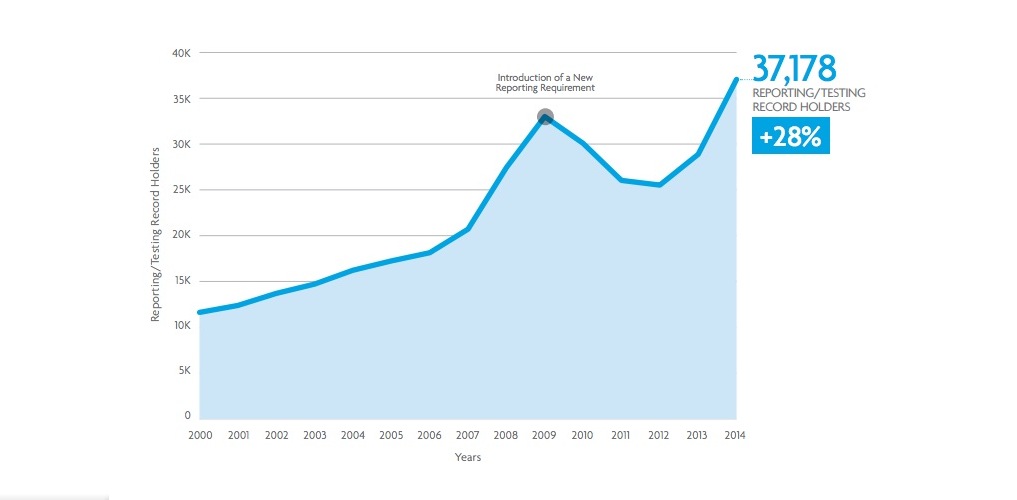The National Council of Architectural Registration Boards (NCARB) released the 2015 edition of NCARB by the Numbers, a yearly report about the path to licensure. The redesigned publication is available for free download at www.ncarb.org/NBTN.
The latest NCARB data reveals a number of positive trends relating to both the future of the architectural community and NCARB’s regulatory and licensing efforts.
“The architect profession is healthy and growing,” said NCARB CEO Michael Armstrong. “The report’s findings also help validate the efforts of NCARB and its licensing board members to open doors of opportunity for qualified people in the architecture profession without sacrificing the rigor needed to ensure public health, safety, and welfare.”
The report’s findings indicate progress in several key areas:
• A record high of 37,178 aspiring architects either reporting hours through the Intern Development Program (IDP) or testing for the Architect Registration Examination (ARE).
• 107,581 licensed architects reported by the 54 U.S. licensing boards, a 3% increase since 2011.
• The average age of an architect upon initial licensure fell to 33.3 in 2014, shaving off 2.7 years since 2008.
• Racial and ethnic minorities made up 41% of the aspiring architect talent pool in 2014, compared to 22% in 2007.
• Women made up 38% of aspiring architects who completed the IDP in 2014, compared to 25% in 2000.
• Women also accounted for 35% of candidates who completed the ARE last year, a percentage that has nearly doubled since 2000.
Program changes, as well as NCARB’s renewed focus on providing guidance and clear communications to emerging professionals, have played a big part in improved performance metrics, said NCARB 2014-15 President Dale McKinney, FAIA, NCARB. “NCARB’s 2014 data finds that the growing number of female aspiring architects, combined with those from racial and ethnic minority groups, indicates the future architect workforce should be more diverse.”
Download the full report at: www.ncarb.org/NBTN
Related Stories
| Nov 4, 2013
Architecture and engineering industry outlook remains positive on all major indicators
While still below pre-recession levels, all of the key indicators in the latest Quarterly Market Forecast (QMF) report from PSMJ Resources remain in positive territory.
| Nov 1, 2013
CBRE Group enhances healthcare platform with acquisition of KLMK Group
CBRE Group, Inc. (NYSE:CBG) today announced that it has acquired KLMK Group, a leading provider of facility consulting, project advisory and facility activation solutions to the healthcare industry.
| Oct 31, 2013
74 years later, Frank Lloyd Wright structure built at Florida Southern College
The Lakeland, Fla., college adds to its collection of FLW buildings with the completion of the Usonian house, designed by the famed architect in 1939, but never built—until now.
| Oct 31, 2013
CBRE's bold experiment: 200-person office with no assigned desks [slideshow]
In an effort to reduce rent costs, real estate brokerage firm CBRE created its first completely "untethered" office in Los Angeles, where assigned desks and offices are replaced with flexible workspaces.
| Oct 30, 2013
15 stellar historic preservation, adaptive reuse, and renovation projects
The winners of the 2013 Reconstruction Awards showcase the best work of distinguished Building Teams, encompassing historic preservation, adaptive reuse, and renovations and additions.
| Oct 30, 2013
11 hot BIM/VDC topics for 2013
If you like to geek out on building information modeling and virtual design and construction, you should enjoy this overview of the top BIM/VDC topics.
| Oct 29, 2013
Increased backlogs, margins lead to renewed optimism in global construction
After prolonged economic uncertainty, a majority of executives in the global engineering and construction sector have fresh confidence in the growth prospects for the industry, according to KPMG International's 2013 Global Construction Survey. A general increase in backlogs and margins is giving cause for optimism across the industry, with further growth anticipated.
| Oct 29, 2013
BIG opens subterranean Danish National Maritime Museum [slideshow]
BIG (Bjarke Ingels Group) has completed the Danish National Maritime Museum in Helsingør. By marrying the crucial historic elements with an innovative concept of galleries and way-finding, BIG’s renovation scheme reflects Denmark's historical and contemporary role as one of the world's leading maritime nations.
| Oct 28, 2013
Urban growth doesn’t have to destroy nature—it can work with it
Our collective desire to live in cities has never been stronger. According to the World Health Organization, 60% of the world’s population will live in a city by 2030. As urban populations swell, what people demand from their cities is evolving.
| Oct 28, 2013
Metal roofs are topping more urban dwellings
Given their durability and ease of use, metal roofs have been a common feature on rural houses for decades. Now they’re becoming an increasingly popular choice on urban dwellings as well.

















